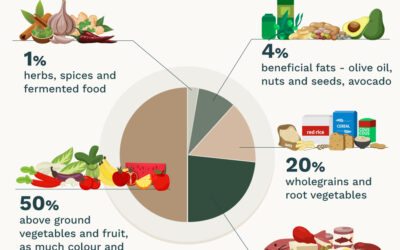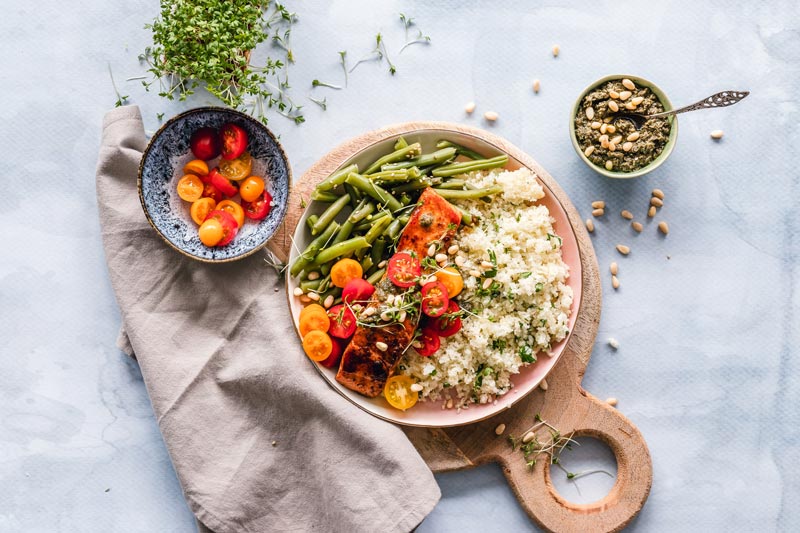Inflammation is a key contributor to pain and research has shown that a balanced approach to diet and lifestyle can reduce inflammation – wonderful foods to enjoy for their anti-inflammatory properties include ginger, turmeric, nuts, seeds and oily fish.
For the people who live with pain daily, a broader therapeutic approach is helpful. I recently talked to Hannah Wilson, the Pain Relief Physiotherapist who shared her experience of supporting people who suffer long term pain.
What conditions are associated with long term pain?
Common conditions that cause people to experience long term musculoskeletal pain include; osteoarthritis, rheumatoid arthritis, fibromyalgia, hypermobility, tendinopathies, and neuropathies.
However, sometimes pain from an injury like a broken bone, muscle sprain, from a fall or after an operation doesn’t go away so the pain becomes persistent or chronic. It can be that the cause of the pain isn’t obvious like in back pain, neck pain or shoulder pain. In fact, long-term pain is common with 1 in 4 adults suffering from a persistent pain problem.
Persistent pain relates to a sensitisation process in the nervous system that is thought to be caused by a chronic low-grade inflammation. Factors such as: tissue health, physical activity/movement, sleep hygiene, mood and distress, social circumstances and occupation, thoughts and beliefs, genetics, other health problems and neuroplasticity all can sensitise and desensitise the nervous system. So long-term pain can be due to a biological problem in the tissues, but sometimes it can be related to stress, eating a lot of processed and sugary foods or poor sleep patterns. Usually, it is due to a combination of factors.
What is your approach to supporting people experiencing chronic pain?
I encourage people that I work with to take an active approach to their care. I believe that overcoming pain usually involves consideration of a combination of treatment strategies. This can include movement and exercise, some hands on therapy, and breathing techniques. I also give practical advice on how to pace daily activity, improve sleep and diet, and educate about pain science.
Acceptance
I encourage people to be open about their worries and concerns about their pain and physical condition and we discuss them in detail. Both the sufferer and their friends and family can find it difficult to accept pain. Acceptance of pain doesn’t mean passively giving in to it, it is about being able to live well despite experiencing it. Working with it rather than against it helps to ultimately overcome it.
Pain can affect how people think and feel within themselves and so their mood can become affected. Experiencing worry, anxiety, frustration, anger and depression is common.
What are your top tips for someone experiencing regular pain?
I have a few tips that I think are very helpful in contributing to pain relief. They do, however, need to be practiced regularly and on an ongoing basis to experience a full benefit.
- Educate yourself on pain science – the more you learn about chronic pain, the more able you are to overcome it. There are lots of online resources with lots of free and easily accessible information.
- Keep yourself as active as possible – there isn’t a ‘right’ type of exercise so try to find something that you enjoy doing.
- Pace yourself – take a break before you need one and don’t feel guilty about it!
- Eat a healthy diet – there is evidence that a Mediterranean diet reduces systemic inflammation and relieves pain in long term painful conditions.
- Keep a good sleep routine – healthy sleep habits can reduce chronic pain in some conditions while poor sleep has been shown to increase pain in others.
- Find your purpose and set some goals – consider what is important to you to help regain purpose and live the life that you want.
- Perform some form of daily relaxation technique – try taking a few deep breaths, meditation or mindfulness, yoga, tai chi or massage therapy.
- Participate in regular social activities with friends and family even if you don’t feel like it.
- Create a positive support system and ask for help when you need it.
- Be kind and compassionate to yourself. It’s not your fault or anyone else’s you are experiencing painful problems.
- Have a set-back plan as unfortunately pain has a habit of returning for no obvious reason – be prepared and have a plan of how to manage those difficult days.
With reframing pain and carrying out daily self-care you can overcome pain and lead the life that you want to live.




